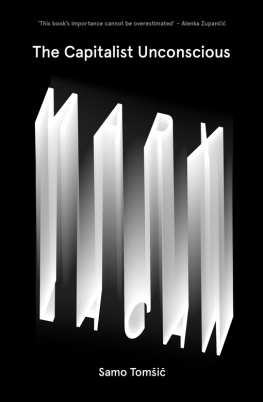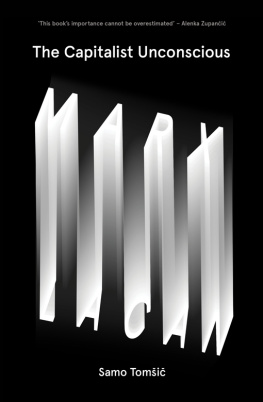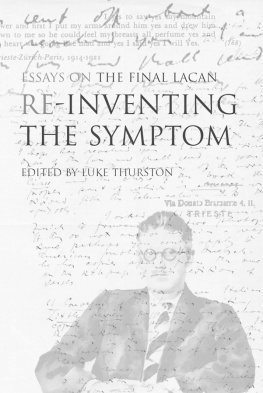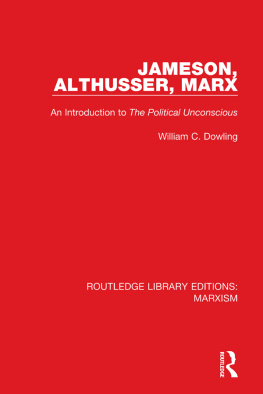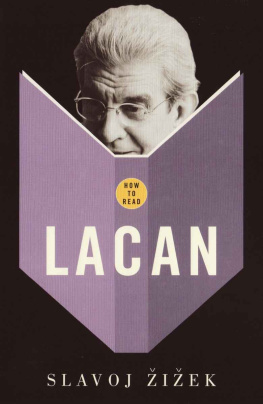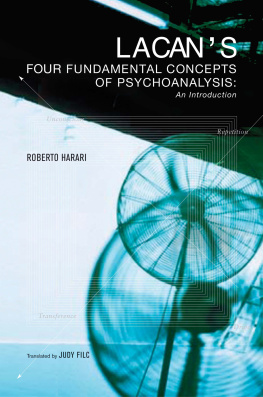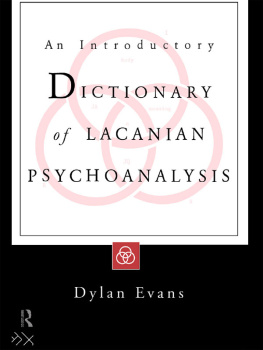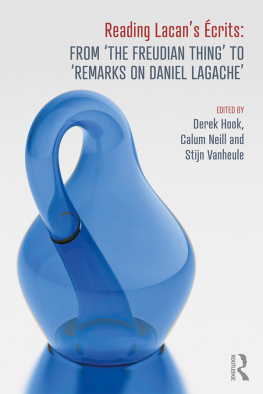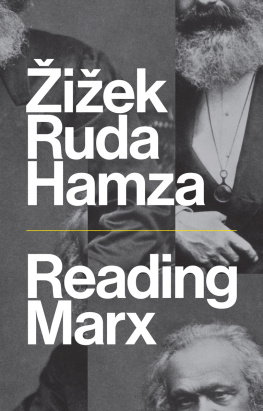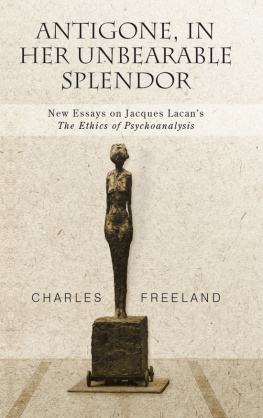I would like to thank to my friends and colleagues who have contributed to the preparation of this volume with their readings, discussions and feedback: Pietro Bianchi, Chiara Bottici, Nathaniel Boyd, Andrew Cole, Jodi Dean, Katja Diefenbach, Michael Friedman, Dominiek Hoens, Sami Khatib, Gal Kirn, Peter Klepec, Botjan Nedoh, Benjamin Noys, Ozren Pupovac, Rado Riha, Eric Santner, Aaron Schuster, Dubravka Sekuli, Jan Sieber, Olivier Surel, Jelica umi, Tzuchien Tho, Dorothea Walzer, Mai Wegener and Andreja Zevnik.
The work on the book began during my postdoctoral research at the Humboldt University in Berlin (201113) sponsored by the Alexander von Humboldt Foundation (Bonn). I am most grateful to Professor Joseph Vogl, who has welcomed me at the Institute for German Literature and supported my research in the most generous way.
The preparation of this volume is most indebted to Mladen Dolar, Alenka Zupani and Slavoj iek, whose work remains a major inspiration for me.
Finally my greatest thanks go to Jenny Nachtigall for her invaluable personal and intellectual support.
Introduction:
Lacans Second Return to Freud
Dont expect anything more subversive in my discourse than that I do not claim to have a solution.
Jacques Lacan, The Other Side of Psychoanalysis
Karl Marx is just one of the many theorists referred to in Jacques Lacans teachings. Other classic thinkers seem to have left a much deeper mark on his work, notably Plato, Descartes and Hegel. Why then, among such an abundance of influences, should one privilege Marx? Is it in order to make Lacan yet another representative of the Freudo-Marxist orientation, a tradition marked by a rather failed endeavour to ground radical politics on the liberation of desire? Or is the aim simply to turn Lacan into a leftist thinker?
Such an attempt is, of course, immediately countered by a wealth of biographical trivia and more or less trustworthy anecdotes regarding Lacans political preferences, which, it is said, inclined towards Charles de Gaulles conservatism. All these consciously controversial statements make Lacan appear more like a predecessor of the nouveaux philosophes than a revolutionary thinker.
In addition to these episodes, the various reservations against reading Lacan as a thinker whose ideas were consonant with Marxs were best taken up by the man himself. He saw the most subversive aspect of his teaching in the fact that he did not pretend to have a solution for social antagonisms. Indeed, among Lacanian psychoanalysts, one often encounters a restraint in discussing political matters, a peculiar distance that often drifts into cynicism and seeks legitimacy in Lacans ambiguous remarks on revolutionary movements. Hence the inevitable question: if psychoanalysis recurrently appears as a form of sophistry that relativises the scope of leftist political struggles and questions their resistance to capitalist forms of exploitation, then why argue for its continued political relevance? Why associate Lacans structural psychoanalysis with Marxs critique of political economy, which provides, and on this point at least both its supporters and opponents agree, the paradigmatic case of a discourse that claims to have a solution?
Lacans teaching is generally associated with its famous motto of a return to Freud. In the following pages I argue that in the late 1960s Lacan initiated a second return to Freud, in which the reference to structural linguistics (particularly Saussure and Jakobson) was supplemented with Marxs critique of political economy. This development inevitably led to a radicalisation of the structuralist research programme and also a rejection of the stereotypes that public opinion, on the Left as well as on the Right, formed about Marx and Freud and their methods, concepts and goals. Some leftist voices would probably claim that psychoanalysis prospers only in the capitalist universe and even that it was historically invented to be nothing more than a class-therapy, serving the mental well-being of the is the paradigmatic case of an ideological operation that maintains desire in the capitalistpatriarchal order. We nevertheless have to acknowledge that Lacan insistently countered these criticisms, for instance by demonstrating the mythical status of the Oedipus complex in Freuds theories and by dethroning the infamous primacy of the phallus which the critiques of Freud continue to reduce to its anatomical signification, thereby reproducing the vulgarised version of Freudianism, which has barely anything in common with the epistemic complexity of Freudian and Lacanian psychoanalysis.
There are also the voices of free-market ideologists, cognitive-behavioural therapists and neuroscientists, who immediately recognise in psychoanalysis a time- and money-consuming practice, incapable of providing society, that is, the demands of the market, with what it requires: an adaptable and flexible workforce. So while for the leftists all psychoanalysis does is normalise, for neoliberals it never normalises enough and should therefore be abolished. In opposition to these two options, the guideline of the present book will be that psychoanalysis remains a symptomatic point, both epistemologically and politically speaking, that offers a particular critical insight into the production of capitalist subjectivity.
As for Marx, his work is often criticized as being at once utopian and disastrous. Marx is said to have composed something equivalent to a gospel that, in its endeavour to dissolve the capitalist mode of production, also promises the abolition of all forms of social antagonism. One often encounters the notion that Marx called for unmediated and authentic human That said, we could certainly claim that Marx never intended to elaborate a communist worldview and that speculation about the future social order did not belong in his mature critical work. In addition to this, Capital openly refutes the conventional reading of the 11th thesis on Feuerbach, the opposition of theory and practice, interpretation and revolutionary change.
Marxs critical project repeatedly shows that the passage from interpretation to political action involves a move from the production of philosophical, political and religious worldviews which, as Freud would later mockingly claim, spend their time filling in the gaps of reality to a materialist interpretation that, in quite the opposite fashion, uncovers the very gaps that existing worldviews strive to foreclose. By detecting these structural gaps, the materialist method provides a rigorous understanding of

